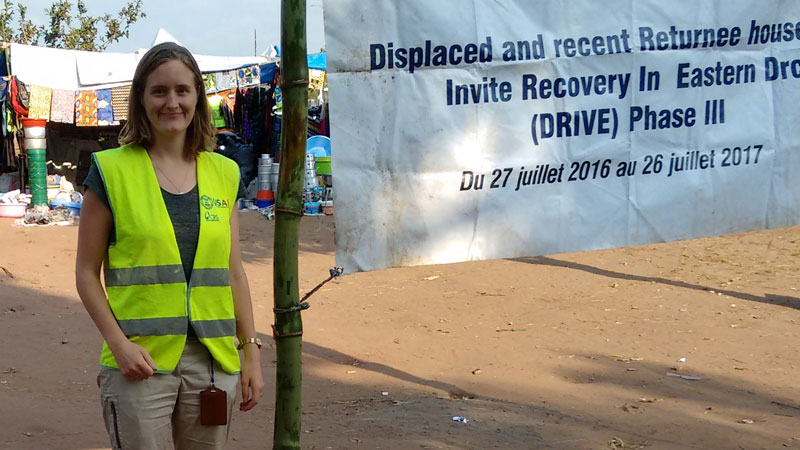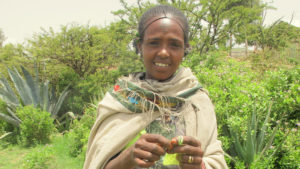Working in emergencies: meet Zoë, our Emergency Support Officer

Zoë Corden tells us what it is like working for CAFOD’s Emergency Response Team and what a typical day in the office is like for her.
What is your role at CAFOD?
I am an Emergency Support Officer in the Emergency Response Team. We are a small team of people who are sent into all types of emergencies that CAFOD responds to. My job is to help CAFOD partners when an emergency happens.
What kind of emergencies does CAFOD respond to?
We respond to a range of emergencies and no two are the same. There are ‘rapid onset’ emergencies, that hit suddenly, like earthquakes and floods, which you’ll usually see in the news; but there are also smaller emergencies that sadly don’t make the news, or receive so much money, despite many people being affected – we call these ‘hidden’ emergencies.
Find out how the Emergency Response Team helps people caught in emergencies
There are also ‘chronic emergencies’ where there is an ongoing or frequently occurring emergency all the time, sometimes for more than a decade. Chronic emergencies often last so long because they are not new and they don’t get much media coverage (for example, Darfur in Sudan has been in a state of emergency since 2004). Emergencies can frequently occur because of a mixture of reasons, including ongoing conflict, weather patterns, or climate change.
I could be sent to any one of these types of emergencies as part of my job.
Did you always know you wanted to work for an international charity?
No! When I was small I wanted to be a mad scientist, and even now I’m still not sure what I want to do. What I have always known is that I don’t want to cause or contribute more harm to people in the world.
Working on humanitarian programmes can be difficult because sometimes it feels like we are not making that much progress on more ongoing problems to end the suffering. Even after years of work we continue to see huge needs (growing now more than ever). We are providing aid and humanitarian solutions to what are often, at their core, political problems. Until the political problems are being dealt with, people will still be in need of our help.
Which emergencies have you worked on?
I’m currently in the Democratic Republic of Congo (DRC) on secondment to CAFOD’s sister organisation Catholic Relief Services (CRS). I’m helping to provide cash coupons and essential household items (like buckets, toiletries, and saucepans) to families who have had to leave their homes because of war and conflict. We then hold a fair and families choose what they want to buy. These items don’t sound that exciting, but they are essential to people who have lost their homes and belongings.
Previously I was supporting the Syria Crisis response from London, helping to set up new projects in Lebanon and Syria. Prior to that, I was in Ethiopia to help our partners on an emergency project that gave out seeds to families affected by the drought.
Find out what your support of the Ethiopia Crisis Appeal achieved
I have also been sent to Sierra Leone for our Ebola response, Greece for the refugee crisis, and Nepal following the earthquake there in 2015.
What’s your favourite memory of meeting someone helped by CAFOD?

I met Hidat Cherqos during my work in Ethiopia last year. Married with 5 children she farmed 0.25 hectares of land – roughly the size of a tennis court – for a living but her crops had failed, because of the drought, and she had no seeds for the following year. Last year, to survive she sold her cows and lived on a small amount of government aid. As part of our emergency work, she was given wheat seeds. If she had not received the aid she would have had to give 50 percent of her land and harvest to someone who could give her seeds. I remember talking to her and realising what this project had meant for her. She told me that with that additional 50 percent of the harvest she could feed her children for 3 to 4 months. It was a simple project, but it made a big difference to her.
When the Ethiopia drought hit in 2015, thousands of families were at risk of starvation. Donations to CAFOD’s appeal saved many lives.Read how your support provided vital aid to people in need.
What makes CAFOD’s response in emergencies unique?
CAFOD works through local partners who are already on the ground and know the communities that are affected. So, when an emergency strikes they are often the first on the scene and can reach the most vulnerable.
Working through local partners means that when we share knowledge, the knowledge stays local, helping our partners to become stronger and grow.
For most emergencies, we discuss things with our partners, and then give them the money they need to help people in need. However, in large emergencies, sometimes these partners are overwhelmed. In these cases the Caritas network (which CAFOD belongs to) and its global team can manage the response with the national Caritas of that country. Membership of this global Caritas network makes CAFOD unique in England and Wales.
Why are regular donations to the Emergency Response Team so important?
Regular donations to the Emergency Response Team go into a special pot (or fund) set aside specifically for emergencies. When an emergency strikes (big or small) we make a transfer from this fund, usually within hours, to partners on the ground, to aid their response.
This money is also used to help in more complex, ‘hidden’ emergencies, like in South Sudan and DRC. Regular donations allow us to act fast when new emergencies strike, or old ones flare up. Because we know the money is already there. If another emergency happens, we can act without waiting for donations to come in from an appeal. It also means that we are not so reliant on the media to encourage donations through their coverage.
For example, when the Nepal earthquake happened, we sent £200,000 from our emergency pot to our partners immediately. But the generous response we then received from supporters in England and Wales meant that we could scale up our response, even more, to respond to this huge humanitarian disaster. The extra donations we received is allowing us to deliver a 3-year response, supporting affected families with initial rapid relief (providing food, water, temporary shelters) and now, long-term recovery (rebuilding houses). Furthermore, because CAFOD’s supporters were so generous, we were able to replenish the Emergency Response Team fund that was spent in Nepal, which means we could respond to other emergencies that didn’t make the news in 2015.
What’s a typical day like for an Emergency Support Officer?
A typical day depends on where I’m working. I can be sent to help CAFOD partners with activities in local communities like distributions, where we give out food and other items which will usually involve starting around 7am and finishing late, maybe around 8 or 9pm.
But a lot of our work is also about helping with funding applications, training, logistics and ensuring things run as well as possible. So we are often based in CAFOD or partner offices working with local staff.
My work changes depending on what the programme needs, so I have to be flexible because it changes rapidly. I frequently work during weekends and evenings when I’m based overseas. I work with partners to improve systems and make sure our projects run smoothly.
When running a project, we listen to the people who have been affected to find out what they need. And we make sure we can reach as many vulnerable people as possible and ensure that our programmes are as dignified as possible for the people receiving support. All this needs to be done as quickly as possible in an emergency, often in places that have poor infrastructure and security challenges.
Sometimes what people need changes or develops quite rapidly, so we often adapt our projects after they’ve started. To deliver an emergency project swiftly and effectively, we have many processes and minimum standards to meet. It is my job to make sure this happens. For example, our partners need to show how they’ve spent funds and that they have staff codes of behaviour and child protection policies in place. If these things, amongst others, are not in place we will help them develop these as quickly as possible while they are responding to the emergency.
Every partner is different and the support I provide will differ, so a typical day in the office will depend on the partner too.
Aside from work, what else do you do?
I have been in DRC since May, and I have been spending most of my spare time trying to improve my French. I also draw (badly but I’m improving) and exercise, which helps me to manage stress. When I’m back in the UK (where I’m based) I enjoy exploring the countryside and catching up with friends and family. I find that when I come home I always have a renewed appreciation for the UK and especially the fresh air. The grass is always green in the UK.
Learn more about our Emergency Response Team and how you can get involved.